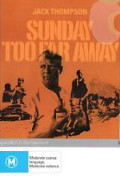
Directed by
Ken Hannam
94 minutes
Rated M
Reviewed by
Bernard Hemingway


Sunday Too Far Away
Made at a time when Australians were throwing off the colonial mantle and film was a major contributor to the process Sunday Too Far Away is a classic Australian story of a sheep-shearing season in 1950s country New South Wales. Although there are a couple of gratuitously crowd-plasing touches - notably the pretty cocky's daughter and Jack Thompson's teary turn - the screenplay by John Dingwall, a former newspaper police roundsman and writer for the Crawford TV production house (Homicide, Division 4, Matlock Police were all on his C.V), who based the story on the experiences of his brother-in-law, a "gun" shearer, lovingly and convincingly depicts the social and economic underpinnings of mateship, a working class ethic born out of the battle for survival in a harsh land.
Dingwall’s original script dealt with shearer’s strike of 1956. The film that we see, is confined to a particular shed and by concentrating on a small group of well-drawn characters it graphically brings home the shearers’ truism: “Friday night too tired, Saturday night too drunk, Sunday too far away”
In the lead, Jack Thompson gives an excellent performance supported by a top cast of well-known 1970s names including Reg Lye who is outstanding as the alcoholic "Old Garth" as well as John Ewart and Max Cullen.
The film was the first feature produced by the South Australian Film Corporation, established in 1972. Made on a budget of $300,000, it was shot entirely on location near Port Augusta and Quorn in South Australia and used the same shearing shed used in the 1959 Chips Rafferty feature film, The Sundowners (a more readily recognizable reference is the reproduction of Tom Roberts' iconic 'Shearing The Rams'which can be seen behind the bar of the pub).
The film won Best Film, Best Actor in a Leading Role for Thompson, and Best Actor in a Supporting Role for Lye at the 1974/75 Australian Film Awards. It also made history by being the first Australian film selected for the Director's Fortnight at the Cannes Film Festival.
Want something different?





